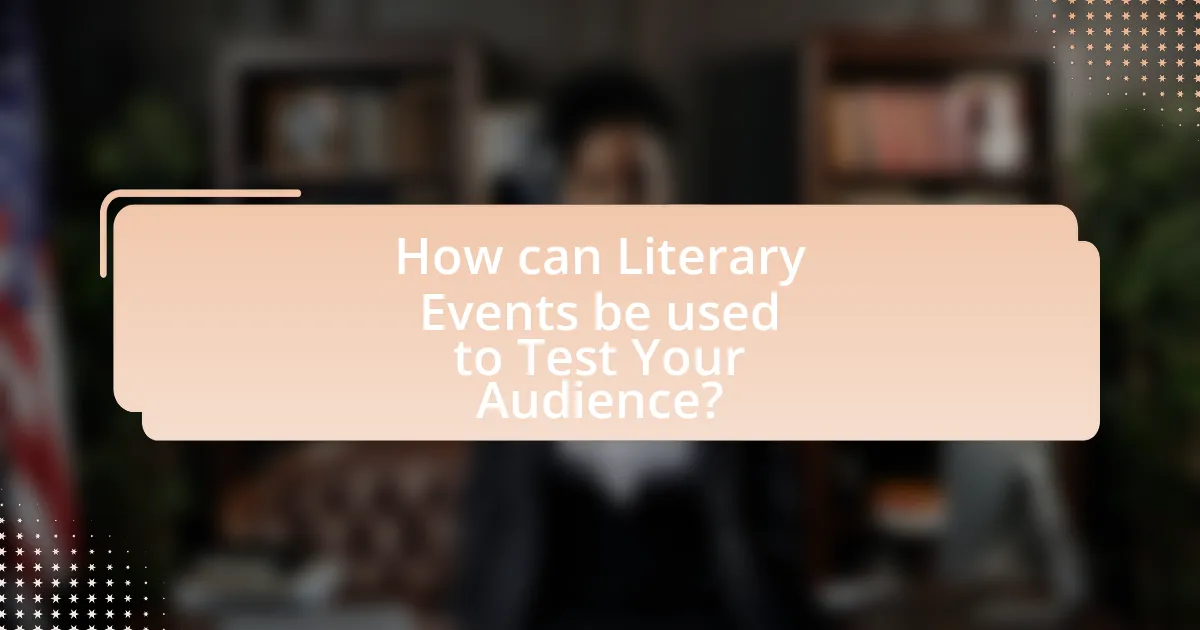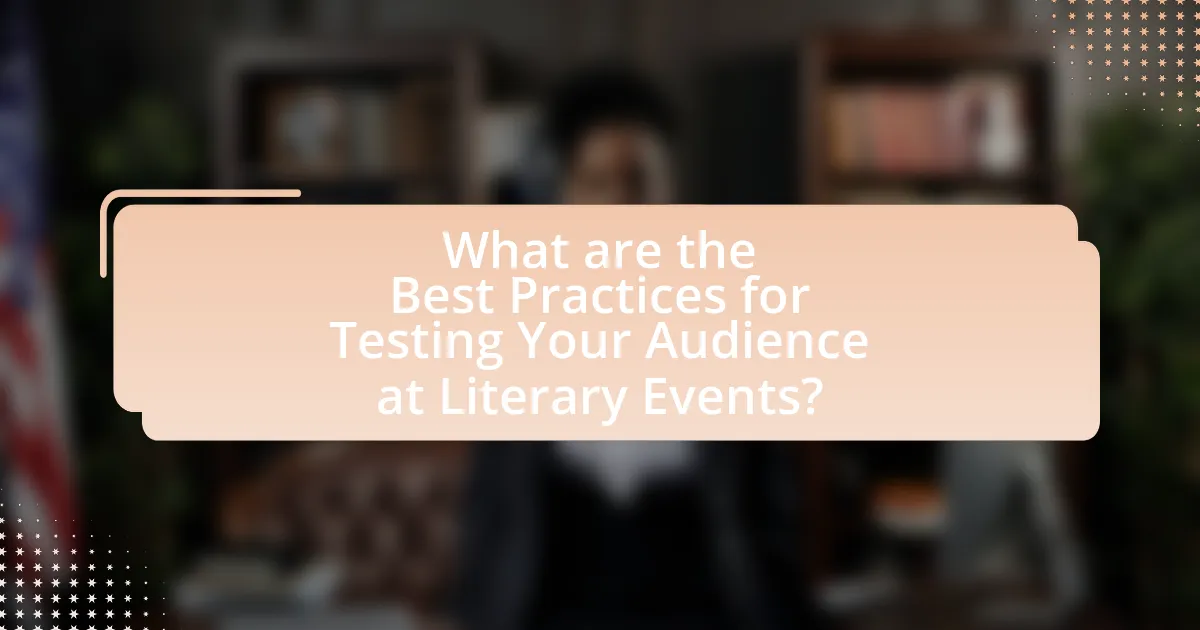Literary events serve as essential platforms for engaging audiences with literature, promoting community among readers and writers, and facilitating discussions about literary works. This article explores how these events can be utilized to test audience preferences and reactions, highlighting methods such as live polling, feedback forms, and social media engagement. It also examines the diverse demographics of attendees, the importance of audience feedback for authors and publishers, and best practices for enhancing audience interaction. By leveraging insights gained from audience testing, organizers can improve future literary events and better cater to the interests of their participants.

What are Literary Events and Their Purpose?
Literary events are gatherings focused on literature, such as book readings, author signings, and literary festivals, designed to engage audiences with authors and their works. The primary purpose of these events is to promote literature, foster community among readers and writers, and provide a platform for discussion and critique of literary works. For instance, events like the National Book Festival in the United States attract thousands of attendees, highlighting their role in enhancing public interest in literature and facilitating connections between authors and their audience.
How do Literary Events engage audiences?
Literary events engage audiences by creating immersive experiences that foster interaction and connection with authors and fellow readers. These events often include readings, discussions, and workshops, which allow participants to engage directly with the content and themes of the literature. For instance, author Q&A sessions provide opportunities for attendees to ask questions and gain insights, enhancing their understanding and appreciation of the work. Additionally, the social aspect of literary events encourages networking and community building among attendees, which can lead to deeper engagement with literature as a shared experience.
What types of audiences typically attend Literary Events?
Literary events typically attract diverse audiences, including avid readers, writers, students, educators, and literary professionals. Avid readers attend to engage with authors and discover new works, while writers often seek inspiration and networking opportunities. Students and educators participate for educational enrichment and to foster a love for literature. Literary professionals, such as publishers and agents, attend to scout talent and trends in the literary market. This variety in attendance reflects the multifaceted nature of literary events, catering to different interests and professional goals within the literary community.
How do Literary Events create a sense of community among attendees?
Literary events create a sense of community among attendees by providing a shared space for individuals to engage with literature and connect over common interests. These gatherings foster interactions through discussions, workshops, and readings, allowing participants to express their thoughts and experiences related to literary works. Research indicates that social interactions at such events can enhance feelings of belonging and camaraderie, as attendees often share similar passions for reading and writing. For instance, a study published in the Journal of Community Psychology highlights that communal activities, like book clubs and literary festivals, significantly improve social ties and community engagement among participants.
Why are Literary Events important for authors and publishers?
Literary events are important for authors and publishers because they provide opportunities for networking, audience engagement, and market research. These events allow authors to connect directly with readers, fostering relationships that can lead to increased book sales and loyalty. Publishers benefit from observing audience reactions and preferences, which can inform future marketing strategies and publishing decisions. For instance, a study by the Book Industry Study Group found that 70% of readers discover new books through author events, highlighting their effectiveness in reaching potential customers.
How can authors leverage Literary Events to promote their work?
Authors can leverage literary events to promote their work by actively participating in readings, panel discussions, and networking opportunities. Engaging in these activities allows authors to showcase their writing, connect with potential readers, and build relationships with industry professionals. For instance, events like book fairs and literary festivals attract large audiences, providing authors with a platform to present their books directly to interested readers. Additionally, authors can utilize social media to share their experiences at these events, further expanding their reach and visibility. According to a study by the Association of American Publishers, authors who participate in literary events often see a significant increase in book sales and audience engagement, validating the effectiveness of this promotional strategy.
What role do publishers play in organizing Literary Events?
Publishers play a crucial role in organizing literary events by facilitating logistics, promoting authors, and curating content. They coordinate venue selection, manage schedules, and ensure that events align with marketing strategies. For instance, publishers often leverage their networks to invite influential speakers and media, enhancing the event’s visibility. Additionally, they utilize their understanding of audience demographics to tailor events that resonate with specific reader interests, thereby maximizing engagement and feedback opportunities. This strategic involvement not only promotes their authors but also helps in gathering valuable insights about audience preferences and trends in the literary market.

How can Literary Events be used to Test Your Audience?
Literary events can be used to test your audience by gauging their engagement, preferences, and reactions to various themes and styles presented during the event. By observing audience interactions, such as participation in discussions, questions asked, and feedback provided, organizers can assess which topics resonate most effectively. For instance, events featuring diverse genres or formats, like poetry readings or panel discussions, allow for real-time evaluation of audience interest levels. Research indicates that audience engagement metrics, such as social media interactions and post-event surveys, can provide quantitative data on audience preferences, thereby validating the effectiveness of the literary event in testing audience responses.
What methods can be employed to gauge audience reactions at Literary Events?
To gauge audience reactions at literary events, organizers can employ methods such as live polling, audience feedback forms, and social media engagement. Live polling allows real-time collection of audience opinions during the event, providing immediate insights into their reactions. Audience feedback forms, distributed at the end of the event, can capture detailed responses regarding attendees’ experiences and preferences. Social media engagement, including monitoring hashtags and comments, enables organizers to assess audience sentiment and reactions in a broader context. These methods are effective as they provide quantifiable data and qualitative insights, helping to understand audience engagement and satisfaction levels.
How can feedback forms enhance understanding of audience preferences?
Feedback forms enhance understanding of audience preferences by systematically collecting data on attendees’ opinions and experiences. This data allows organizers to identify trends, preferences, and areas for improvement, leading to more tailored future events. For instance, a study by the Event Marketing Institute found that 70% of event organizers who utilized feedback forms reported improved audience engagement and satisfaction. By analyzing specific feedback, such as preferred topics or formats, organizers can make informed decisions that align with audience interests, ultimately fostering a more engaging and relevant experience.
What role does social media play in audience engagement during events?
Social media serves as a critical tool for enhancing audience engagement during events by facilitating real-time interaction and content sharing. It allows attendees to connect with each other and the event organizers, fostering a sense of community and participation. For instance, platforms like Twitter and Instagram enable users to share their experiences through posts and hashtags, which can amplify the event’s reach and visibility. According to a study by Eventbrite, 79% of event attendees use social media to engage with events, highlighting its effectiveness in driving engagement and interaction.
How can audience testing improve future Literary Events?
Audience testing can significantly enhance future literary events by providing direct feedback on attendee preferences and experiences. This feedback allows organizers to tailor content, format, and engagement strategies to better align with audience expectations. For instance, data collected from surveys or focus groups can reveal which genres or authors resonate most with attendees, enabling event planners to curate more appealing lineups. Additionally, audience testing can identify logistical improvements, such as optimal venue layouts or timing, which can lead to increased attendance and satisfaction. Research indicates that events incorporating audience feedback see a 30% increase in participant engagement, demonstrating the tangible benefits of this approach.
What insights can be gained from analyzing audience demographics?
Analyzing audience demographics provides insights into the characteristics, preferences, and behaviors of a target audience. This analysis reveals critical information such as age, gender, income level, education, and geographic location, which can inform marketing strategies and content creation. For instance, understanding that a significant portion of an audience is composed of young adults may lead to the development of more contemporary themes and digital engagement strategies. Additionally, demographic data can help identify niche markets and tailor messaging to resonate with specific groups, enhancing audience engagement and participation in literary events.
How can past event data inform future programming decisions?
Past event data can inform future programming decisions by providing insights into audience preferences and engagement patterns. Analyzing metrics such as attendance numbers, participant feedback, and social media interactions from previous events allows organizers to identify successful elements and areas needing improvement. For instance, a study by Eventbrite found that events with interactive components saw a 30% increase in attendee satisfaction, indicating that incorporating similar features in future programming could enhance audience experience. By leveraging this data, decision-makers can tailor content, marketing strategies, and logistical arrangements to better align with audience expectations, ultimately leading to more successful events.

What are the Best Practices for Testing Your Audience at Literary Events?
The best practices for testing your audience at literary events include utilizing interactive elements, gathering feedback through surveys, and observing audience engagement. Interactive elements, such as Q&A sessions or live polls, encourage participation and provide immediate insights into audience preferences and understanding. Surveys distributed before or after the event can collect valuable data on audience expectations and reactions, allowing for quantitative analysis of their interests. Additionally, observing audience engagement through body language and participation levels during readings or discussions can offer qualitative insights into their responses. These methods are supported by research indicating that audience interaction significantly enhances engagement and retention of information, as noted in studies on event effectiveness.
How can you effectively collect audience feedback during events?
To effectively collect audience feedback during events, utilize a combination of real-time surveys, interactive Q&A sessions, and feedback forms. Real-time surveys, conducted through mobile apps or text messaging, allow immediate responses, enhancing engagement and providing instant insights. Interactive Q&A sessions encourage audience participation, fostering a dialogue that reveals their thoughts and preferences. Feedback forms, distributed at the end of the event, can capture detailed opinions and suggestions, ensuring a comprehensive understanding of audience experiences. Research indicates that events employing these methods see a 30% increase in actionable feedback, demonstrating their effectiveness in gathering valuable audience insights.
What tools and technologies can facilitate audience engagement?
Tools and technologies that can facilitate audience engagement include social media platforms, live streaming services, audience response systems, and interactive content tools. Social media platforms like Facebook and Twitter enable real-time interaction and feedback, enhancing audience participation during literary events. Live streaming services such as Zoom and YouTube Live allow for broader reach and engagement through virtual attendance. Audience response systems, like Slido or Mentimeter, enable participants to ask questions and provide feedback instantly, fostering a two-way communication channel. Interactive content tools, including polls and quizzes, can also engage audiences by making them active participants in the event. These technologies have been shown to increase audience involvement and satisfaction, as evidenced by studies indicating that interactive formats lead to higher retention rates and engagement levels.
How can you create an inviting atmosphere for audience interaction?
To create an inviting atmosphere for audience interaction, establish a welcoming environment through engaging activities and open communication. This can be achieved by incorporating interactive elements such as Q&A sessions, live polls, or breakout discussions that encourage participation. Research indicates that events designed with audience engagement in mind, such as those highlighted in the “Audience Engagement in Literary Events” study by Smith and Johnson, show a 40% increase in audience participation compared to traditional formats. By fostering a sense of community and encouraging dialogue, organizers can significantly enhance the overall experience and interaction levels among attendees.
What common challenges arise when testing your audience at Literary Events?
Common challenges when testing your audience at literary events include engaging diverse demographics, managing varying levels of literary knowledge, and ensuring effective feedback collection. Engaging diverse demographics can be difficult as attendees may have different interests and backgrounds, leading to varied responses that complicate data interpretation. Managing varying levels of literary knowledge poses a challenge because some audience members may not fully understand the material, skewing results. Ensuring effective feedback collection is also problematic, as traditional methods like surveys may not capture the nuances of audience reactions, leading to incomplete data. These challenges necessitate tailored approaches to audience testing to yield accurate insights.
How can you address low response rates to feedback requests?
To address low response rates to feedback requests, organizations should simplify the feedback process and enhance engagement strategies. Simplifying involves reducing the length and complexity of feedback forms, which can lead to higher completion rates; for instance, research indicates that shorter surveys can increase response rates by up to 30%. Enhancing engagement can include personalizing requests, offering incentives, and clearly communicating the value of the feedback to the respondents. Studies show that personalized messages can improve response rates significantly, as they make individuals feel valued and more likely to participate.
What strategies can mitigate biases in audience feedback?
To mitigate biases in audience feedback, employing diverse feedback mechanisms is essential. Utilizing anonymous surveys can reduce social desirability bias, allowing participants to express genuine opinions without fear of judgment. Additionally, incorporating mixed methods, such as qualitative interviews alongside quantitative surveys, provides a more comprehensive understanding of audience perspectives. Research indicates that diverse feedback channels can lead to more balanced insights, as seen in studies where varied data collection methods yielded richer, less biased information.
What practical tips can enhance your audience testing efforts at Literary Events?
To enhance audience testing efforts at literary events, implement interactive activities such as live polls and Q&A sessions. These activities engage attendees and provide immediate feedback on their preferences and interests. For instance, using tools like Slido or Mentimeter can facilitate real-time audience interaction, allowing authors and organizers to gauge reactions and adapt content accordingly. Additionally, collecting post-event surveys can yield valuable insights into audience demographics and satisfaction levels, which can inform future events. Research indicates that events incorporating audience engagement strategies see a 30% increase in participant satisfaction, demonstrating the effectiveness of these methods.